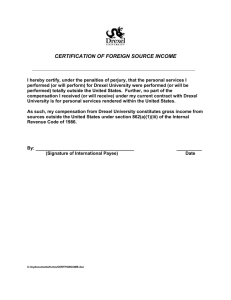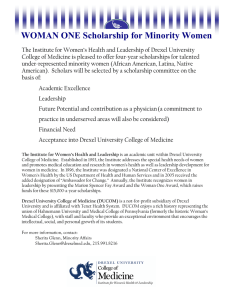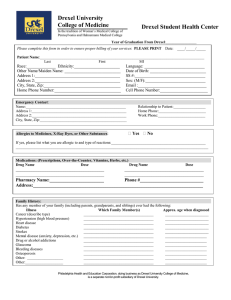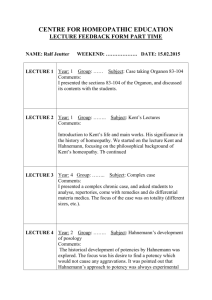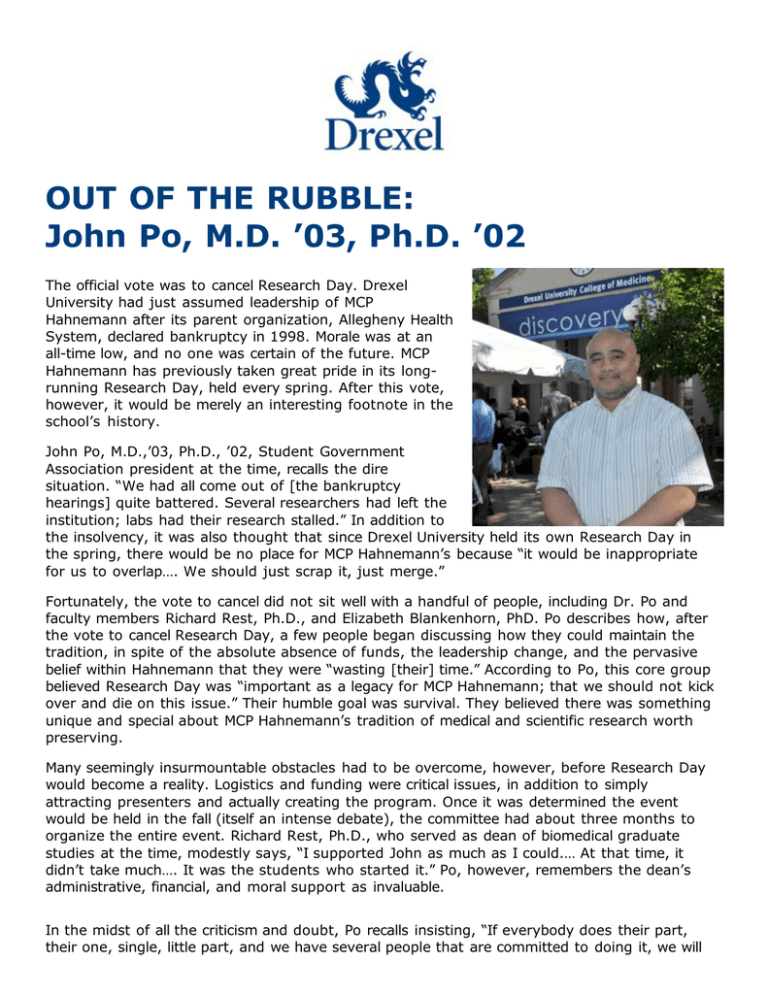
OUT OF THE RUBBLE:
John Po, M.D. ’03, Ph.D. ’02
The official vote was to cancel Research Day. Drexel
University had just assumed leadership of MCP
Hahnemann after its parent organization, Allegheny Health
System, declared bankruptcy in 1998. Morale was at an
all-time low, and no one was certain of the future. MCP
Hahnemann has previously taken great pride in its longrunning Research Day, held every spring. After this vote,
however, it would be merely an interesting footnote in the
school’s history.
John Po, M.D.,’03, Ph.D., ’02, Student Government
Association president at the time, recalls the dire
situation. “We had all come out of [the bankruptcy
hearings] quite battered. Several researchers had left the
institution; labs had their research stalled.” In addition to
the insolvency, it was also thought that since Drexel University held its own Research Day in
the spring, there would be no place for MCP Hahnemann’s because “it would be inappropriate
for us to overlap…. We should just scrap it, just merge.”
Fortunately, the vote to cancel did not sit well with a handful of people, including Dr. Po and
faculty members Richard Rest, Ph.D., and Elizabeth Blankenhorn, PhD. Po describes how, after
the vote to cancel Research Day, a few people began discussing how they could maintain the
tradition, in spite of the absolute absence of funds, the leadership change, and the pervasive
belief within Hahnemann that they were “wasting [their] time.” According to Po, this core group
believed Research Day was “important as a legacy for MCP Hahnemann; that we should not kick
over and die on this issue.” Their humble goal was survival. They believed there was something
unique and special about MCP Hahnemann’s tradition of medical and scientific research worth
preserving.
Many seemingly insurmountable obstacles had to be overcome, however, before Research Day
would become a reality. Logistics and funding were critical issues, in addition to simply
attracting presenters and actually creating the program. Once it was determined the event
would be held in the fall (itself an intense debate), the committee had about three months to
organize the entire event. Richard Rest, Ph.D., who served as dean of biomedical graduate
studies at the time, modestly says, “I supported John as much as I could.… At that time, it
didn’t take much…. It was the students who started it.” Po, however, remembers the dean’s
administrative, financial, and moral support as invaluable.
In the midst of all the criticism and doubt, Po recalls insisting, “If everybody does their part,
their one, single, little part, and we have several people that are committed to doing it, we will
get this done.” Fortunately, “everybody did their
little thing and did it well.”
About 25 to 30 abstracts were submitted for that
first Research Day. There were three or four
platform presentations. There was a speaker and a
cold lunch and the day ended promptly at 4:30
p.m.
“We were just happy to get the darn thing
altogether,” Po reveals. “We had platform
speakers, a main speaker, and an afternoon poster
judging session. Then at 4:30 we announced the
winners. I said, ‘Well, thank you very much. See you next year.’ So we did it. Some people
were quite surprised we were able to come up with an organized [event]…. That was the
beginning.” Rest says, “We were all trying our best, and of course, it worked out.”
Even with this modest beginning, ambitious seeds were planted. When the organizing group
wanted to name the event “Research Day,” Po recalls arguing, “That’s really, really boring.
There’s no inspiration there. Remember, this is something you want people to aspire to.
Discovery Day. I think that’s where the entire thing came out.”
Discovery Day has certainly come a long way from its modest beginnings.
In October 2009, over 300 abstracts were submitted. There were 12 panel presentations and a
newly endowed, internationally recognized keynote speaker. Over 500 people attended. The
cold lunch has been replaced by a formal awards banquet at the City Line Hilton. Esteemed
alumni are invited back as judges, and their own events and symposia stretch over two days.
Students hail Discovery Day as a valued time to connect with alumni and learn from their
experience. Indeed, many credit Discovery Day as a flagship event for the College of Medicine,
both for its celebration of academic inquiry and its inspirational tone.
Po credits the synthesis of MCP Hahnemann and
Drexel as the genius engendering the day. He
employs the image of the chimera, the
mythological hybrid beast, to illustrate how the
various parts of each institution have become
more powerful once combined. He says, “A lot of
the core values from MCP Hahnemann…merged
with the practicality and inspiration of Drexel….
This is actually the best of both worlds. From this
rubble that we had at MCP Hahnemann,
[Discovery Day] has now come out to be really a
much better program and event.” He elaborates,
observing, “Discovery Day is one of the best
Discovery Day Poster Presentations
examples of being able to achieve something
better than the parts in terms of what each of
our separate institutions could ever have done on its own. We’ve been able to come up with a
research day that isn’t just academic but inspirational.”
Rest is similarly proud of Discovery Day’s evolution. “I tout Discovery Day to a lot of my
colleagues outside of Drexel Med,” he says. “I never thought I would be such a chauvinist for
Drexel Med, but I’m becoming more and more of one. There are very few places that spend the
money and the effort to have a research day like this…. This is pretty incredible.”
Barry Waterhouse, Ph.D., current vice dean of biomedical graduate and postgraduate studies,
and Rest credit Po with galvanizing those early students and saving Research Day from
becoming a mere footnote. Po is quick to cite the administrative and moral support he received
from others at the time as leading to the day’s fruition. For example, Kirsten Larson, Ph.D.,
volunteered to be the chief judge for the first Discovery Day. She has served in that capacity
ever since, “a monumental task for a volunteered position,” as Po notes. Yet it is apparent that
many, many people are involved in Discovery Day’s success today. Waterhouse explains, “This
is an event organized in a partnership between the graduate students, the Office of Biomedical
Graduate Studies staff – which does a spectacular job – and Patty Comey and her Alumni
Office…. It’s not a one-man show at all…. That’s how it has really evolved over the years.” Rest
adds, “The person-power out of Barry’s office is just amazing…the planning is amazing. It just
doesn’t happen that many places.”
In 2010, Po was presented with the Distinguished
Discovery Award. He observes, “This year when I
went back, I never would have thought [Research
Day] would end up like this. I really didn’t. It’s
really an honor when Dr. Waterhouse said, ‘This
is your legacy to the University.’ I never thought
that during my Ph.D. years.”
John Po, M.D., Ph.D. receives the Distinguished
Discovery Award from Barry Waterhouse, Ph.D., Vice
Dean of Biomedical Graduate and Postgraduate
Studies
Po argues that by continuing to fund the event,
particularly through the endowed speaker, the
College can attract “excellent, inspiring speakers”
to further arouse and motivate its unique
community of researchers. “I hope that it can
continue to awe, particularly in terms of its
prestige and its quality.” Discovery Day has
indeed become a flagship for the College of
Medicine. “It is a fantastic advertisement,” Rest
succinctly observes.
That’s not a bad outcome for an event that was
almost voted out of existence. “I never thought
Drexel would embrace us,” Po confides about the
rough transition period. “I thought [Research Day] would be MCP Hahnemann’s little legacy
thing that they’ll do on the side…. [Instead Drexel] was inclusive…. There was an integration;
now it’s part of a greater whole…. I think it can only get better.”
© Copyright 2013 - Drexel - All Rights Reserved.

